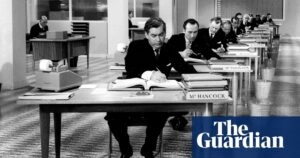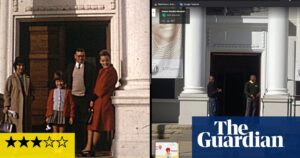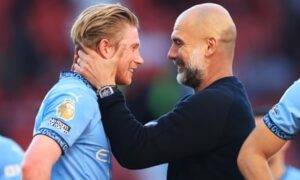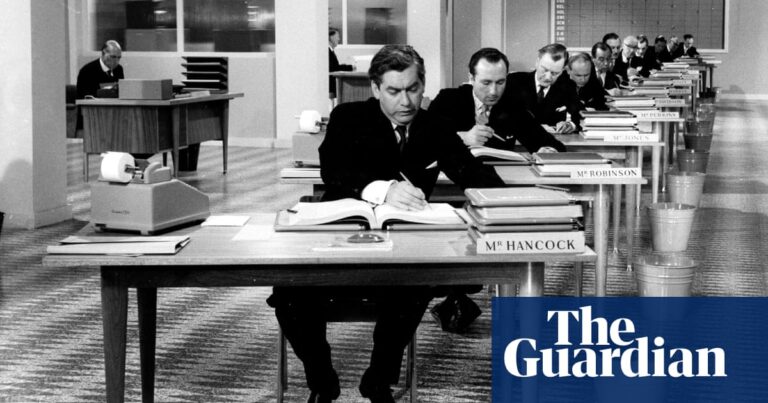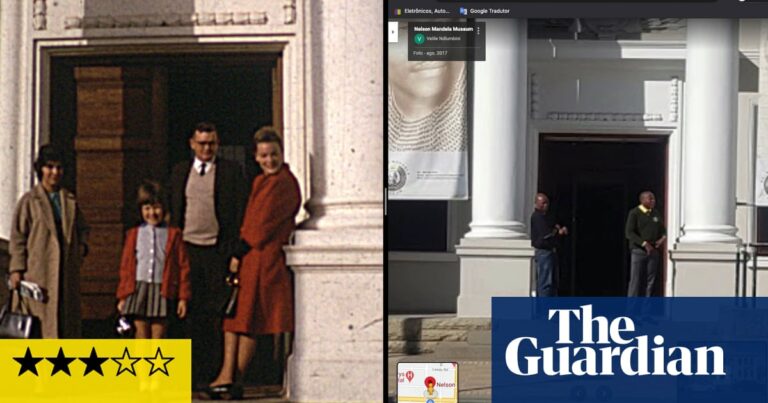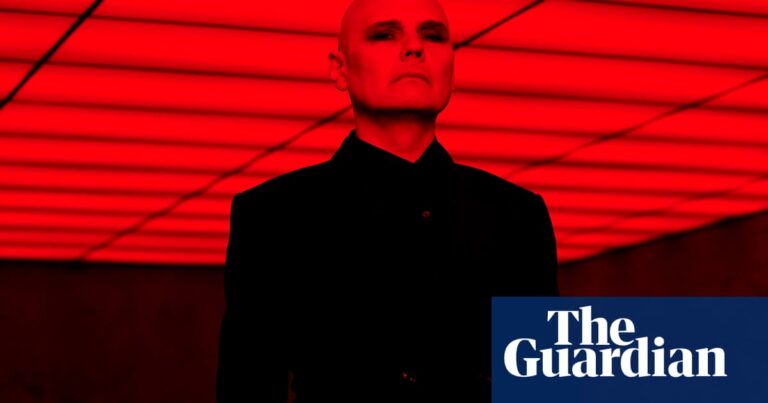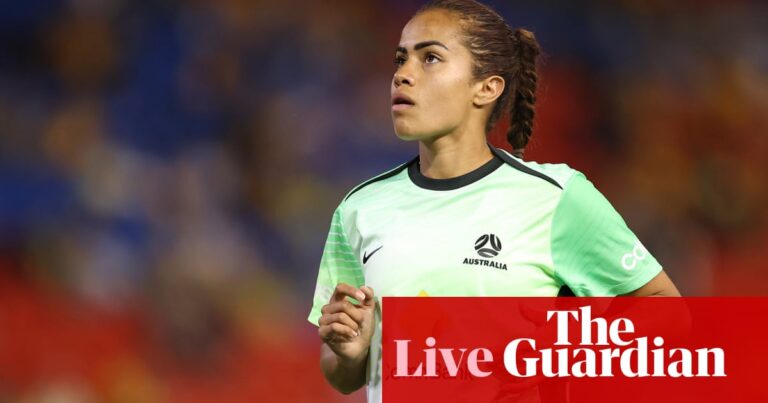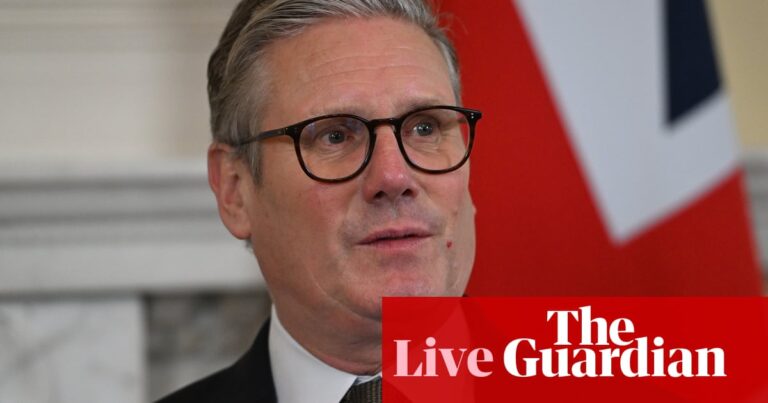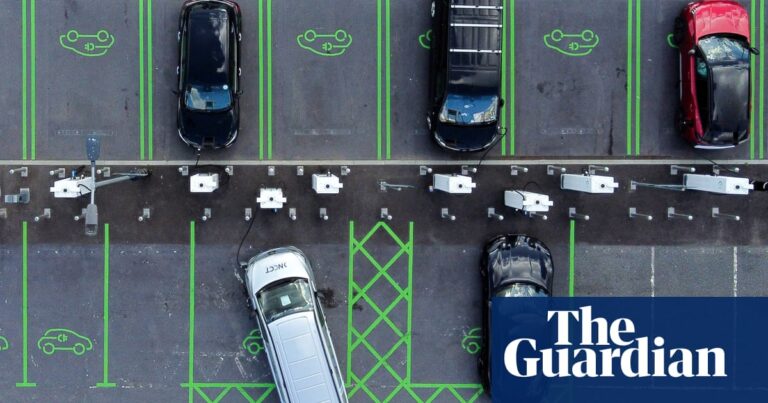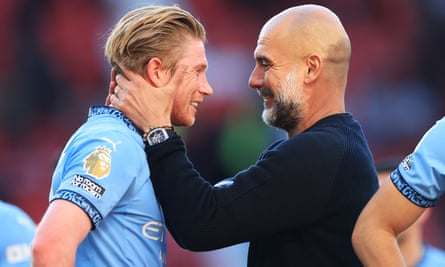There is a jokey meme that captions a picture of Mitski with “Therapists HATE her”. Her songs can make you doubt what love, happiness and stability are even for. Over the course of six albums, the 31-year-old has become the US’s best young singer-songwriter, stating her feelings with dry amusement or real pain. Her songs are vignettes heavy with painterly symbolism. She connects squalling indie-rock to ambient ballads with plenty in between; her chords never resolve in the way you think they will, rather like life. Perhaps therapists hate her because she is putting them out of a job – as well as being troubling, her music is often uplifting, cathartic and compassionate.
It turns out she is in therapy herself. “I love therapy! Having someone to talk to, who you don’t feel like you’re burdening, because it’s their job – it really eases up all your friendships,” she says, laughing. “You’re saying it out loud, giving it words; it clears things up. In America, there’s still this notion that you’re not good until you’re happy. I hope we can get away from that.”
We meet in a very posh London hotel in November and sit in a sort of elite smoking area, for maximum ventilation: “I should have a cigar,” she says. Masked up, she occasionally widens her eyes for emphasis.
Mitski’s frankness has made her a cult figure among millennials and gen Z – generations that have rejected emotional repression with such enthusiasm – but her new album, Laurel Hell, should carry her into the mainstream. It is an immediate pop record, but with complex songs that continue to grow on you. Her touchstones while making it were “Scott Walker, Vangelis, Giorgio Moroder, Iggy Pop during his Berlin years, Arthur Russell and a secret reference that we perhaps shouldn’t reveal: Hall & Oates”.
She recalls her wilfully naive mindset while making it: “When was a time when everyone felt hopeful and everything is happening and everything is good? The 80s bubble! That feeling of possibility, having lots of money. I wanted to channel that feeling, just to get out of the fog of the pandemic.” A lot of the songs were written in or before 2018, so she and her producer-instrumentalist Patrick Hyland “had time to consider every detail, for better and for worse. It’s not good for mental health to have no limitations and just be focused for so long.”
In other ways, the pandemic has been a positive time for her. Mitski Miyawaki was born to a Japanese mother and an American father, whose work as a diplomat took them all over the world. She studied music in New York and her career took off soon after, sending her into another itinerant life of touring. The strictures of the pandemic, spent in a new base in Nashville, allowed her to “learn how to live like a regular person. I started baking; I learned how to garden. It turns out I don’t have a green thumb, because I’m so used to getting things done on the fly. But, with plants, you can’t force them to grow in a soil they don’t like; you can’t rush their growth. Each thing needs its own amount of water, its own environment.”
It is a very Mitskian comment, employing the type of double meaning that crops up in her songs, whether it is alluding to panic via turbulence on a plane, or telling a potential lover on the Laurel Hell track Valentine, Texas: “Let’s step carefully into the dark / Once we’re in, I’ll remember my way around.”
To expand on her metaphor: did she lack roots? “I did. For sure. It’s just too difficult to go from one place to another and continue to lose things, or lose people; it’s been nice to teach myself it’s OK to become attached.” She gives the example of touring: “Every day, the audience is different. You love them that day, but then you can’t form attachments to anyone there, because you go to the next show. I’d found that I needed to guard my heart, so that I didn’t just feel loss every day. So it is nice to be in this position where I have a home to miss. It feels really dear to me, actually, that I am expected back.”
She played dozens of brilliantly theatrical gigs for her 2018 album Be the Cowboy, her first masterpiece. Working with the choreographer Monica Mirabile, Mitski cycled through female archetypes – including coquette and housewife – on stage as she sang, posing across kitchen furniture. The kneepads she chose to wear let us know she was protecting herself, holding something back, even at her most cartoonishly sexy.
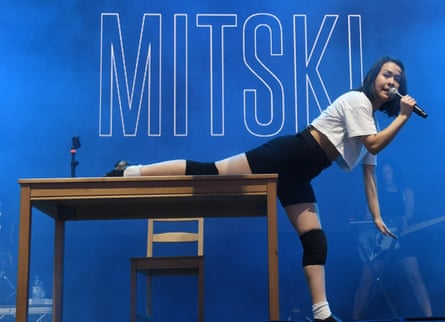
“I was dealing with being an object that’s looked at,” she says. “Being a woman, an Asian woman, there are all these different projections that people put on me, and I guess the choreography was me trying to figure out how to deal with that. And playing with it: I would signify to people that I’m being sexual, but I would have a stone face.” She loved wearing the kneepads. “There’s a sense of security, like you can go out and take risks.” No doubt her therapist has noted them.
Mitski is open about her need for self-protection, which played out on Be the Cowboy as a series of personas that she hid behind and through which she sang the songs, “accentuating parts of myself”. The title of that album was a mantra for self-confidence when she didn’t always have it. “Putting on that guise of being a brash, confident person was a way to protect the vulnerable parts of myself that I didn’t want to world to get at,” she says. “The flipside was that it really hardened me, because I didn’t allow myself to be soft, ever. I always had the masks on.” Even in friendships? “I didn’t even have time for friendships! But it affected my writing, because in writing you have to be vulnerable.”
The cultish keenness of her fans, though, can make vulnerability difficult. “I am a musician, but the reason they really pay me the big bucks” – she smiles wryly – “is to be the place where anybody can put all of their feelings, their ugliness, that doesn’t have a place in their own lives. I’m like the black hole where people can dump all their shit, whether it’s a need for love, or it’s hatred and anger. So I’ve seen a lot of the ugliness of people … I’ve put myself in this position where anyone can really do anything they want to me. I’m always fearful of somebody who might not have good intentions finding me and doing something to me.”
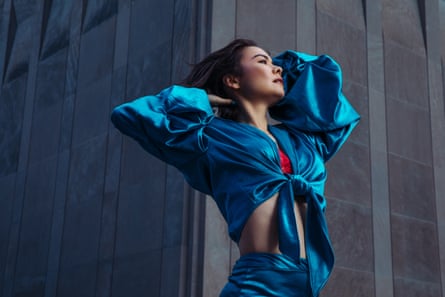
She recalls finishing a solo show in a small venue without security where she needed to make her way through the crowd to reach her dressing room. “People were unrelenting. Everyone needed a piece of me, whether it was a photo, or my autograph, and then I was so overwhelmed being surrounded by hands grabbing at me that I was crying, but they still didn’t seem to see my crying face. People started to grab at my shirt and, by the time I got out, my shirt was basically off. It was an emblematic moment – that has been happening to me in different ways.”
Another one of these ways, which she won’t discuss, is the virality of an unproved fan theory that her father was in the CIA. For extremely online people, who are suspicious of policing and yet enforce absolute moral purity, this would be a failing on her part.
“It almost doesn’t matter what music I write and put out into the world. At the end of the day, I’m a woman in public, allowing myself to be consumed. I put out songs, but really what people are buying is the product that is me.” What product do people think they are buying? “I genuinely don’t know.” Being Asian complicates things further. “Even completely private citizens who are Asian women are more objectified, fetishised and expected to be submissive. There’s more a feeling of ownership towards people of my identity, in general. My being in public has made that assumption more extreme.”
Nevertheless, she says, “I don’t want to continue to make music that is protective of myself. The music I love, that has saved me, is the kind that really gets to the heart of myself and the person performing it. And so I decided that even if more harm may come to me, I would be serving my purpose better if I actually wrote something that felt closer to my heart.”
Laurel Hell, then, is Mitski with the kneepads off: less filtered, more frank, more poppy. She will sing to tens of thousands as support for Harry Styles at Wembley stadium this summer; the big single, The Only Heartbreaker, was co-written by Semisonic’s Dan Wilson, who wrote Someone Like You with Adele. Another single, Working for the Knife, addresses “how I have to navigate really exploitative capitalism in order to serve my purpose”.
Has she pondered what a better society might look like? “Every single day, I wish I were smart enough to figure it out. I just know that the way it is now is terrible and I feel my soul dying every day. [At least] I still have the privilege of being able to complain about my soul, you know? Because I’m middle class, I get to talk about my existence – a lot of people don’t have the room to do that. I only seem to be wired to write my little songs about my feelings. It really makes me sad how useless and unintelligent I am. It’s really terrible.”
Her biggest (and, indeed, best) song yet, Love Me More – think Flashdance’s Maniac given 21st-century oomph – is about getting validation from that one skill: “Please take this sole thing that I’m able to do and please love it. It is very desperate, and when you’re desperate you don’t have much time or space to think about how embarrassing it is to be desperate.” There are 81,000 people following a Spotify playlist called “Mitski songs ranked in order of sadness” and the artist is just as droll; she has that rare quality of making self-deprecation endearing.
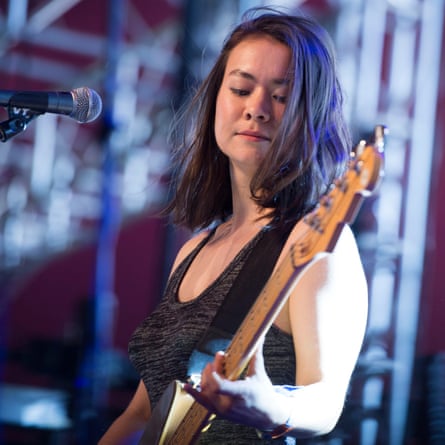
I had assumed that much of the album was about a breakup. The absurdly buoyant That’s Our Lamp gets at a particular dissonant feeling I have never heard expressed in decades of pop heartbreak – the simultaneous horror and exhilaration that your relationship is ending – while a line on I Guess (“It’s been you and me since before I was me”) is a devastating truism of young love. But she says these songs aren’t lifted wholesale from a single breakup, rather crafted from “tiny moments”.
“I never want to say my songs are fictional, because they all come from my feelings and things I’ve seen – it’s just a matter of putting together different parts to make them tell a story and evoke a feeling.” She calls “the human romantic relationship the best metaphor, the best narrative vehicle; this album is about a feeling of ending, a feeling of resignation, and often using the narrative of the ending relationship is the easiest way to convey that emotion.”
Given how specific and true the romantic strife she sings about feels, I find this a bit cool and evasive, especially when she adds that the new song Should’ve Been Me “is about your partner maybe cheating, but because you love this person and you know yourself, you understand their perspective. You understand your part in it. And, through somebody straying and betraying you, weirdly understanding that they loved you so much. You just weren’t there for them – they needed something and you couldn’t give it to them, so they tried to find it elsewhere. I wanted to portray a narrative of compassion, even after being lied to.” Has she been betrayed in this way? She makes an exaggerated shrug. “I’m not going to say.”
Perhaps I am behaving like that audience, too determined to get a piece of her pain. She is polite as she draws boundaries around her romantic history: “I’m more than willing to share my feelings, or things that happened to me. [But] I feel like I don’t have the right to tell someone else’s story.”
Whether betrayed or not, her willingness to share blame is radical in our flamboyantly punitive culture. “This album in general has been a process of me trying to figure out how to forgive myself and other people,” she says. “In my actual moments of tragedy or joy, I do tend to turn towards black-and-white thinking, and often that hasn’t served me.” Writing Laurel Hell, she says, “has been a process of learning how to be kinder to myself and, through that, be kinder to other people. I want to get out of being a hero of the story and being the villain.”
Source: theguardian.com

